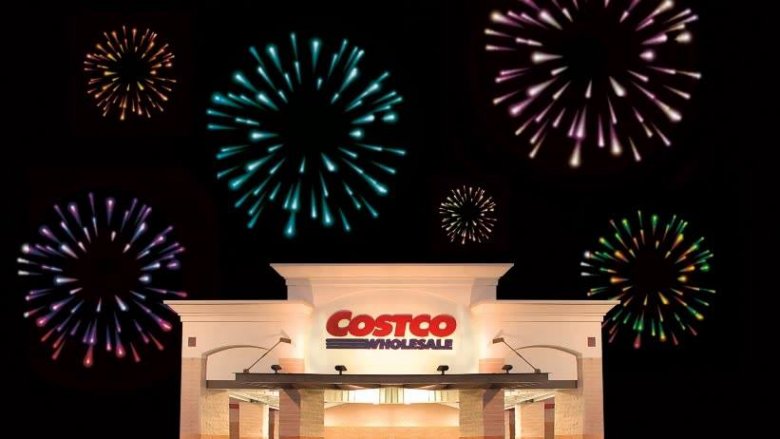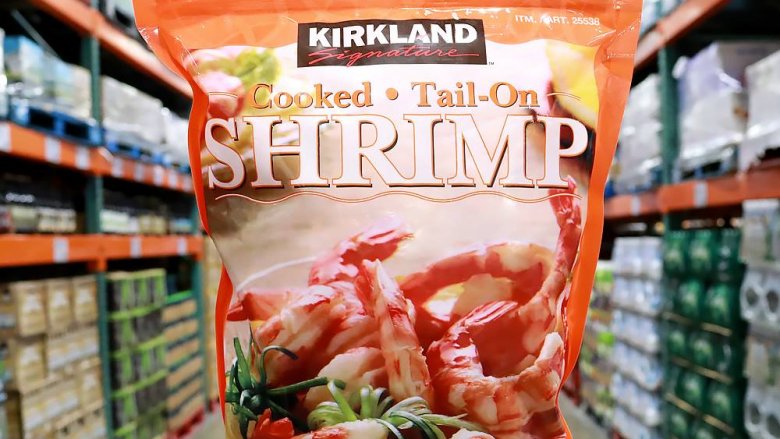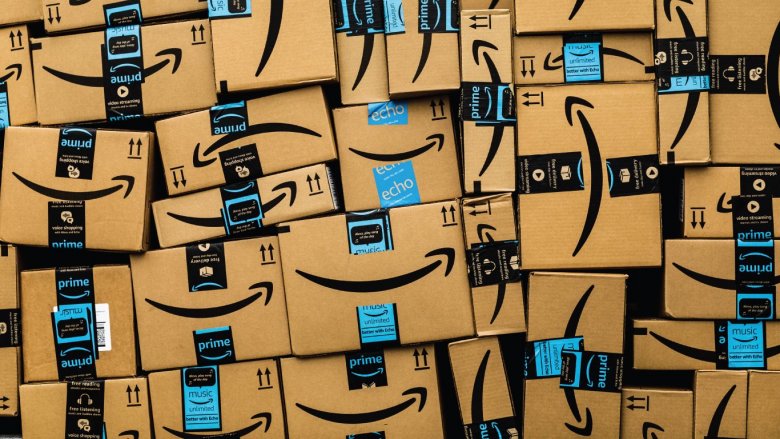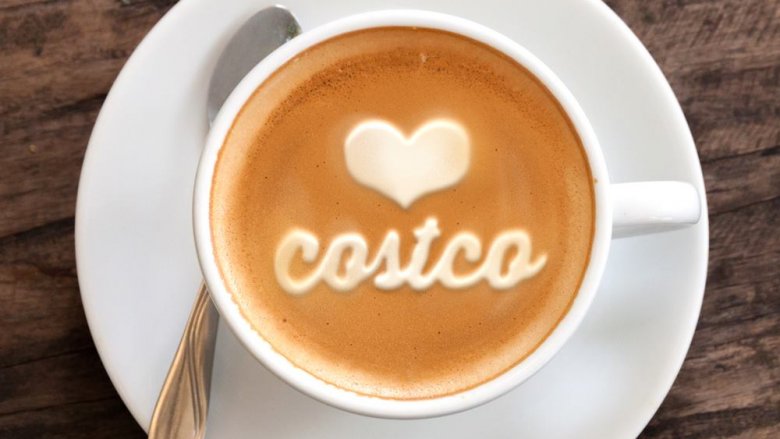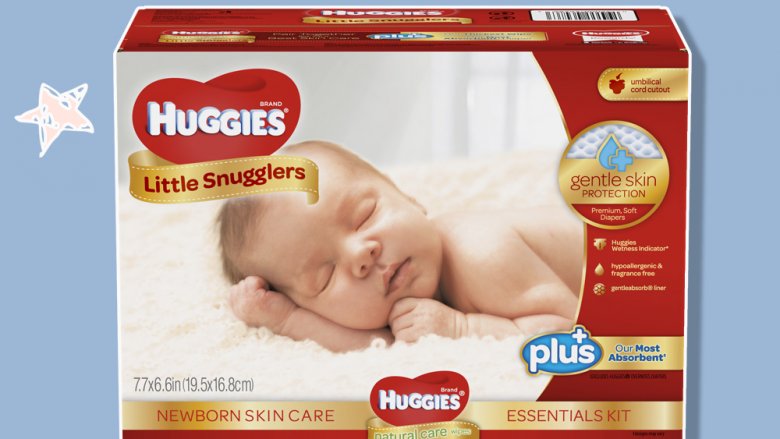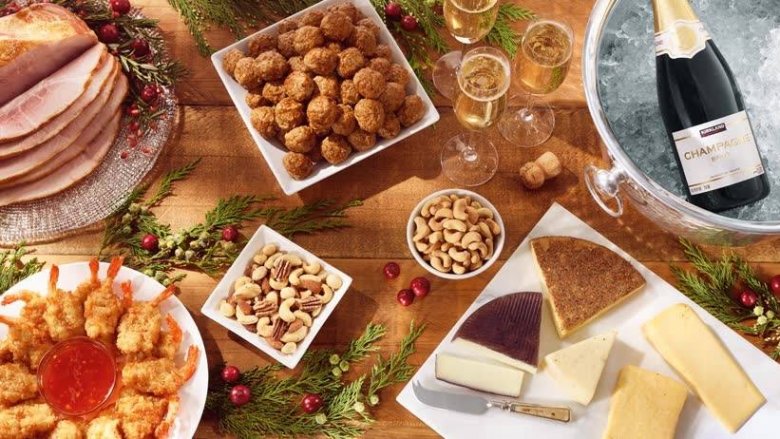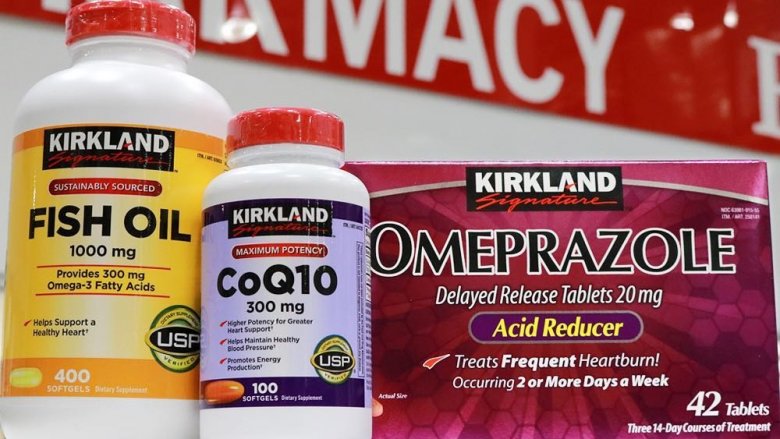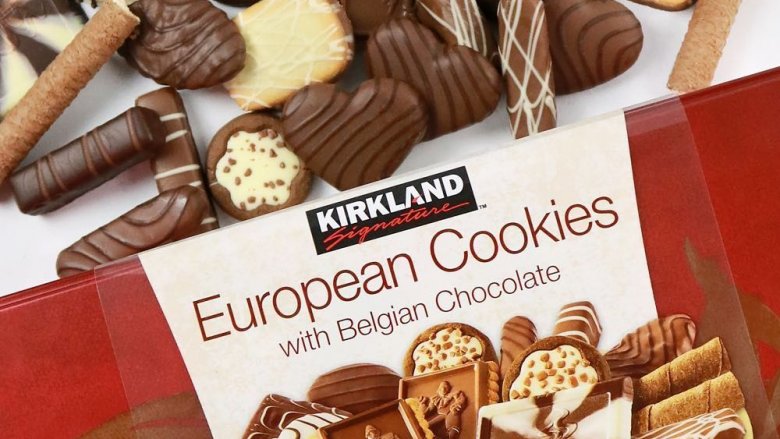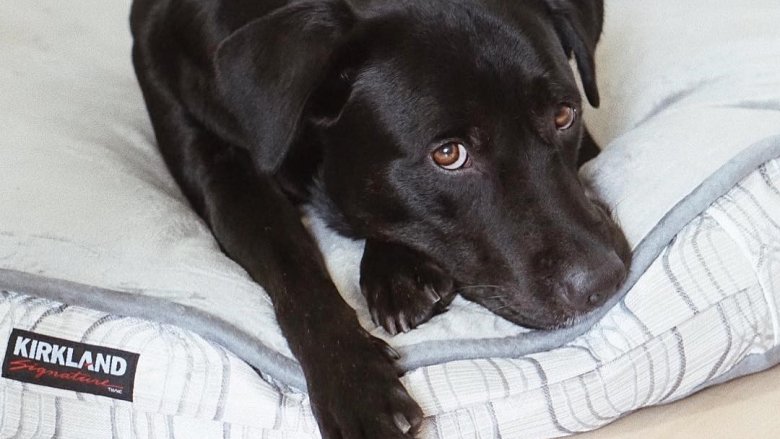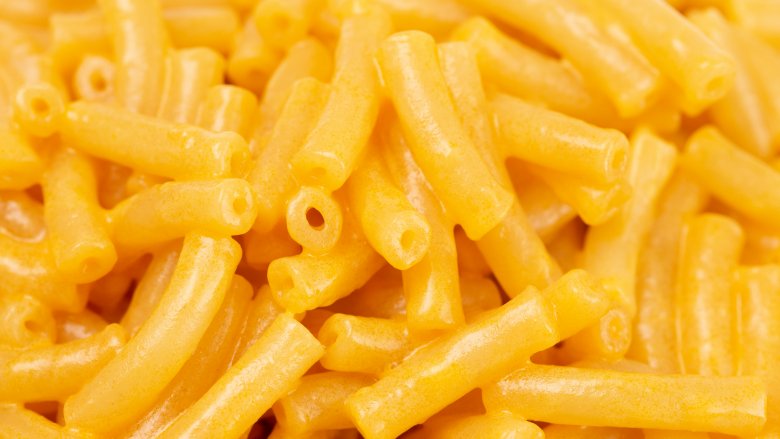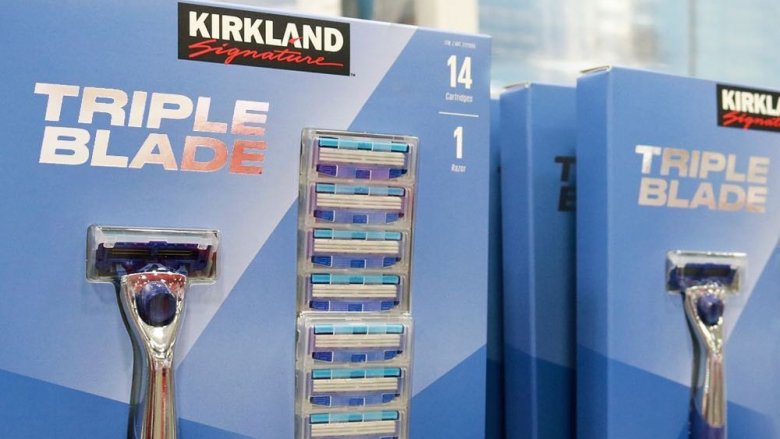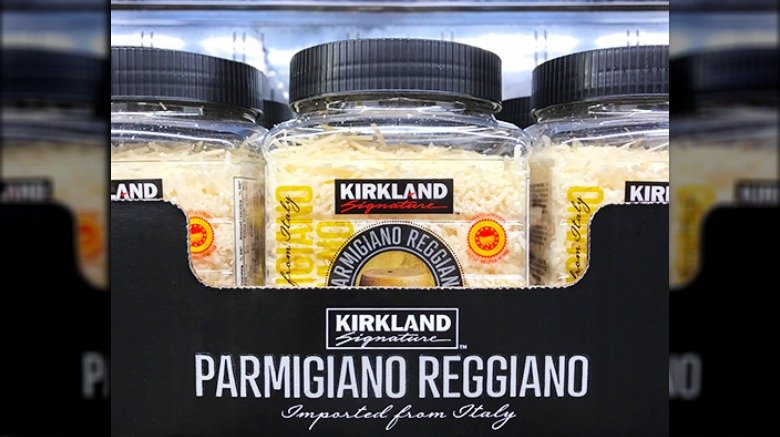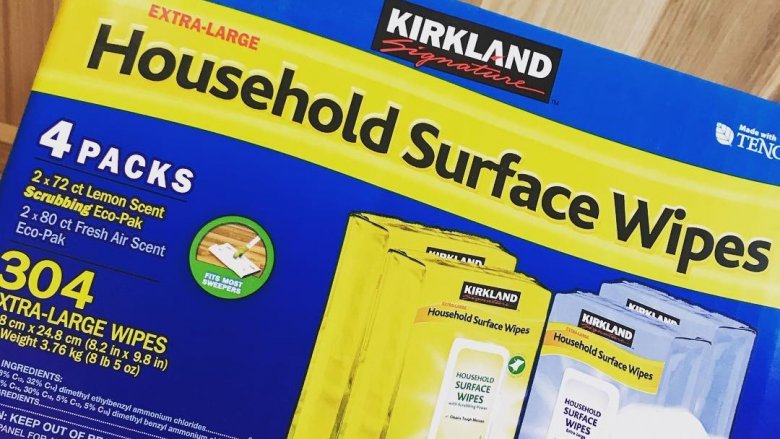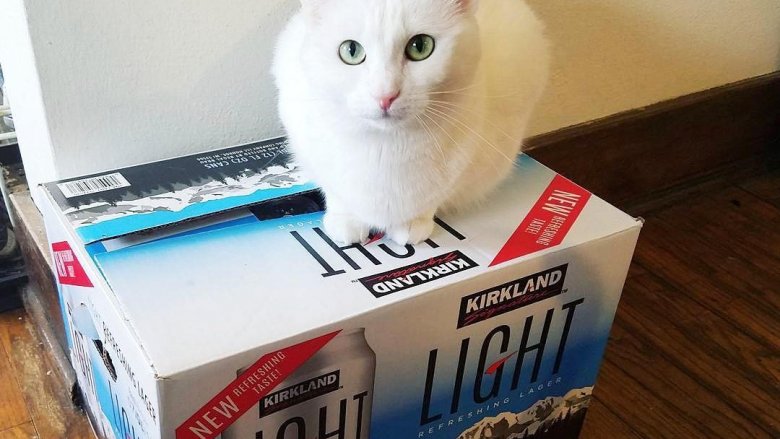The Secret Weapon Behind Costco's Success
When The Motley Fool took a closer look at Costco's shockingly huge numbers to see just what was going on with this massive retailer, they found the warehouse-style store that some people swear by really is doing as well as they boast. Not only did they log a 7 percent sales increase and a 27 percent jump in their net income for 2018, but they also boasted a membership renewal rate of 90.7 percent.
And that's pretty impressive, especially when you consider there's a ton of stores out there that don't charge you a fee to shop. Those who aren't Costco shoppers might wonder what keeps people coming back, but those who shop there regularly are in the know: It's their Kirkland Signature line.
Costco's Kirkland Signature brand is their private label merchandise line. Why is it called that? Fun fact: It was originally going to be called Seattle Signature, but Costco couldn't get approvals for the name. So they went with Kirkland, says The Kirkland Reporter, a nod to Kirkland, Washington, the Seattle suburb that was home to their flagship warehouse at the time they launched the product.
What else should you know about your favorite private label?
Kirkland products are shockingly popular
If you go out of your way to pick up Kirkland diapers, or if you think your addiction to Kirkland Whole Bean Coffees is a guilty pleasure that makes you somehow less of a serious coffee drinker, take comfort in the fact you're not alone in your love of Costco's private label.
In fact, sales from Kirkland branded products account for a pretty shocking amount of Costco's overall sales. According to CNN, 2018 numbers show their sales of Kirkland products alone increased a whopping 11 percent from 2017, and pulled in a total of — are you ready for it? — $40 billion.
Right? That's a heck of a lot of diapers. It's even more shocking when you look at it this way: Kirkland products have higher sales numbers than the entirely of Kellogg, Hershey, and Campbell's Soup combined. Put another way, it's also more than JCPenney and Macy's made combined.
That $40 billion makes up a huge chunk of Costco's 2018 sales. According to MarketWatch, they boasted a whopping $141.58 billion in total sales, and that's up from 2017's $129.03 billion. It's clear Kirkland products are a definite win for the store.
It's allowed them to fend off Amazon
Amazon has been a huge problem for most brick-and-mortar retailers. They have some serious advantages: Not only are their prices usually the cheapest, but you can order right from the comfort of your own home, no pants needed. And you don't even have to wait long to get your stuff — it's as close to immediate as you could hope for.
But Kirkland Signature products are a major weapon in Costco's anti-Amazon arsenal. Retail analyst Simeon Gutman puts it this way for The Wall Street Journal: "If you have something unique, it's un-Amazonable."
And that's a big deal. Business strategists and retail analysts aren't new, but there's actually a specialty within the field dedicated to "digital disruption." Those are the people that study the impact online stores have on more traditional retailers, and Steve Dennis, writing for Forbes, calls Amazon "the proverbial 800-pound gorilla" that's led to a reshaping of the country's commercial landscape. Having a product line that the uber-convenient, super-cheap online giant doesn't have is a huge deal, because the ripple effect caused by Amazon has been equal part far-reaching and devastating. For Costco, Kirkland Signature is the first line of defense.
It inspires brand loyalty
At a glance, it might seem like Kirkland Signature products are just a cheaper version of name brand products, but The Wall Street Journal says that's not the case, and it's an important distinction to make.
As a general rule, Kirkland Signature products are usually slightly different than their name brand counterparts. And since they're something different, customers that fall in love with their particular type of, say, coffee, can't get it elsewhere. And that, says Observa, has helped create a huge shift in the marketplace.
Thanks to brands like Kirkland, private label brands have now become what they call "part of the shopping experience." In the past, consumers were loyal to a brand — they'd only buy Purina or Kellogg products, for example. Increasingly, consumers are becoming more attached to a retailer, and only shopping at their favorite stores, be it Costco or Aldi. Cultivating an image of high quality at a low price makes customers more likely to not just try new Kirkland products, but it also keeps customers coming back to the only place they can get them.
They usually approach name-brand companies first
Kirkland Signature gives Costco an impressive amount of leverage over brand name companies, and strangely, The Wall Street Journal says it's usually those companies that have first crack at making a Kirkland product.
Take diapers. New parents will find Kirkland Signature diapers are a huge bargain, and here's the weird thing. Costco had originally approached both Procter & Gamble (the manufacturer of Pampers) and Kimberly-Clark (the manufacturer of Huggies), and asked them to make a Kirkland branded version. Procter & Gamble declined the offer, but the manufacturer behind Huggies agreed. Now, head to Costco and the only options you'll find are Kirkland Signature and Huggies.
See how that works?
It's also worth noting that just because Costco makes a Kirkland version of a product, that doesn't mean those other products are leaving. When Costco added a knock-off of the Kind Bar to their product line, Kind Bars did stay as a part of their inventory — they just tend to focus on varieties that don't have a Kirkland counterpart.
They're able to control supply chain costs
Being a successful retailer isn't just about getting people through the doors and making sales, it's also about keeping costs and overhead low. And according to Canadian Grocer, a huge part of Costco's success involves their ability to make their supply chain very, very efficient.
A lot of it is down to what's called "fingerprints." That refers to the number of times a product is handled before it reaches the customer, and the more vendors, suppliers, and warehouses that touch a product... that's all money out the window. Costco minimizes the "fingerprints," and as CNN notes, their reliance on their private label brand gives them an opportunity to control every aspect of a product, right from the beginning, and cut out the extra middle-men that come with name brands.
And that control can have some surprising impacts on the bottom line. Take Kirkland cashews. In 2014, Costco changed the shape of the containers from round to square. That allowed them to put more on a truck, improve their space usage, and ultimately lower their costs. Since they own Kirkland, they can maximize their products in little ways that make a big difference.
They really are cheaper — by a lot
Costco and Kirkland Signature have a reputation for being cheaper, but are they really? The Wall Street Journal says that yes, they often are.
When Kirkland Signature products are first conceived, the Costco team is looking for something very specific: a product they can sell at a price point that's at least 20 percent less than name brand competitors. And there's one big factor that makes it possible to do that — their size. Since they're buying in huge amounts, that cuts their costs and ultimately lets them pass savings on to the consumer through their private brand.
And Business Insider says there's plenty of items where Costco beats even Amazon in price. They name things like their Kirkland EVOO, chicken stock, parchment paper, sea salt, pistachios, and maple syrup, and let's be honest — those are all things you can never have too much of.
The same principle applies to Kirkland Signature medicines and over-the-counter drugs. Costco Connection did a side-by-side comparison, and found some shocking savings. Allergy medication costs as much as 92 percent less than name brands, and even things like aspirin and multivitamins are much, much cheaper.
Millennials love private labels
There's no denying that millennials have a bit of a reputation for completely changing the way the nation eats and shops. They've been blamed for the decline of everything from buffets to steakhouses, but here's some good news, millennials: You're the ones that have helped make private labels massively popular.
According to Progressive Grocer, private labels have traditionally been associated with times of economic hardship — not an image you'd think anyone would want to try to build an empire on. But post-2009 recession, private labels have been booming in large part thanks to millennials. Surveys have suggested that a typical millennial's shopping basket is about 32 percent private label, compared to other age groups that go about 25 percent private label. Also post-2009, the image of private labels has been on the rise, with many millennials associating them with higher quality and greater value than they once were.
And for millennials, that's huge. Many are faced with massive student loans, are surviving on single incomes, and are looking for ways to save money without compromising on quality. All that makes private labels and millennials a match made in heaven.
Every product is built from nothing
When Costco's team starts production on a new product, they're not just trying to recreate something that already exists. They're starting from scratch, according to the Costco Connection.
They use the example of a shirt. If they're making a new type of shirt, they reverse engineer it to figure out what the components of a perfect shirt would be, right down to the best type of stitching for longevity and the best ways to make it resist wrinkles and stains... all while still being comfortable. And that's where the process of making all Kirkland Signature products starts — yes, including their shirts.
They also say that just as much thought and effort goes into their packaging, too, and use the example of their laundry detergent. Maybe you've noticed that their bottle has a slightly different shape than most. That was a careful design choice that allows them to fit 120 bottles on a single pallet, as opposed to the standard 90. It helps reduce costs and create savings that end up getting passed on to the consumer, and it also fits better in your own cupboards.
And that brings us full circle. There was a time when private labels were boring (think of the white cans with plain black, block letters that simply read: BEER). Now, with as much thought doing into the packaging as into the product, they're establishing themselves as a serious contender.
What they call the "hidden quality"
The Kirkland team also has something they call "hidden quality," and that's basically everything that goes into their product that the consumer doesn't see on the package or at first glance.
Then-CEO Jim Sinegal explained (via Costco Connection) that their Kirkland Signature sheets are the perfect example of the principle. When he saw a competitor advertising sheets that looked the same at a cheaper price, he called his buyer and asked what was going on. In response, the buyer took one of their sheets and one of their competitor's, washed them, and put them side-by-side. There was a clear difference, and Divatex — who manufactures Costco's sheets — said their higher (hidden) quality starts with the Supima cotton they use.
The same thing is at work in products like their macaroni and cheese. The "hidden quality" there is a specific blend of spring and durum wheat that makes the noodles firmer even after they're cooked, and it's allowed them to take on nationwide favorite Kraft. Sure, you might not be able to see everything that goes into creating a Kirkland Signature product, but their sales numbers show that their fans can definitely tell.
They impact the name-brand market
By now, you're probably thinking that the big name brand corporations should be as worried about private labels like Kirkland as they are about Amazon, and according to Kantar Retail analyst Timothy Campbell (via CNN), Kirkland definitely has an impact on the prices name brand companies charge.
"Kirkland acts as a universal club marshal," Campbell says. "It keep suppliers honest."
Here's just one example: In 2018, Costco took a long, hard look at the price of their 40-packs of Kirkland Signature, half-liter water bottles. Then, they dropped the price. It wasn't long before national name brand companies like Poland Spring dropped their prices, too, and that's some serious influence.
Analysts say Kirkland razors have put some serious pressure on Gillette, their hazelnut spread has stepped on the toes of Fererro just a bit, and their coconut water isn't going over well with Vita Coco. It's good for Costco and it's good for customers, as it's making name brand companies step up to the plate and either rethink their products to compete, or lower prices to, well, compete.
They're the real deal
Customers have to put a lot of faith in stores and in manufacturers — we trust them to give us the real thing, but that doesn't always happen. You've probably heard the staggering statistics behind things like fake olive oil and fake Parmesan cheese. Private label brands have traditionally not inspired the same amount of confidence as more mainstream, nationally known brands, so it seems like they might be likely to cut corners.
According to Money, though, Kirkland Signature products are the real deal.
Take their olive oil. A study from the University of California-Davis found that yes, Kirkland EVOO really was authentic — and it was still much, much cheaper than both authentic and fake olive oil from competitors.
Their Parmesan cheese is the real deal, too. Even though Forbes says the overwhelming majority of parmesan cheese found in the US is fake, Kirkland's Parm is imported from Italy after being aged for two years. You can't get more authentic than that.
Not all products are an undisputed win
For all their devoted fans and their declared dedication to quality, it might seem like Kirkland Signature products are a safe bet to be high-quality, affordable, and just all around good... but there's more to it than that.
They haven't been without their problems, and to start with, let's take a look at their canned fish. In 2014, Greenpeace lauded Costco for announcing their commitment to making their Kirkland skipjack tuna ultra-responsible and super sustainable, removing fishing practices that caught and killed not only skipjack, but other marine life like sharks and turtles. That's great, but they still give Costco a pretty dismal score when it comes to their sustainability. That's largely because their policies didn't extend to their albacore tuna, and Greenpeace is less than impressed with their lack of transparency around other issues, like slavery in their supply lines.
Then, you can also take a look at their cleaning products. The Environmental Working Group gave the majority of Kirkland cleaning products (including their fabric softeners, dish soap, and household wipes) a solid F for undisclosed ingredients, not having green certification, and health issues ranging from asthma and rashes to — in the case of their laundry detergent — environmental concerns and moderate worries over carcinogenic properties. Yikes!
Yes, they do discontinue Kirkland products
Just because you've been seeing your favorite Kirkland products on the shelves regularly, that doesn't mean they're always going to be there. They have discontinued some of their products for various reasons, and perhaps the most high-profile failure was the Kirkland Signature Light Beer.
They didn't just let the product sell out, either. SFGate reports that eagle-eyed consumers noticed it was actually being pulled from shelves. It's not entirely surprising: Response to the beer wasn't great, with one review from RateBeer describing the beer as smelling like "a urine-soaked diaper sitting on a piping-hot radiator".
Well then.
Not all discontinued products are such failures: For example, Redditors lamented the loss of Kirkland's Asiago cheese, and there was even a Change.org petition started in hopes of convincing Costco to bring back their French Comté. According to The Wall Street Journal, they've also discontinued things like cosmetics, toothpaste, and soda. Sad, sure, but not even good things last forever.
